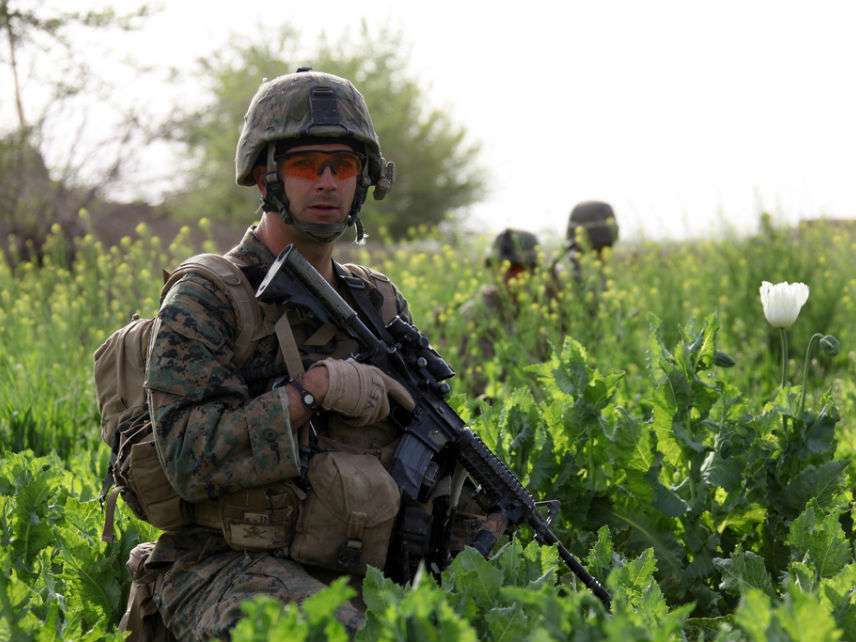2017 a Record Year for Opium Poppy Cultivation in Afghanistan
The fruits of 16 years of war

Opium poppy cultivation has hit a record high in Afghanistan, according to a report from the United Nations Office on Drugs and Crime and Afghanistan's Ministry of Counter Narcotics. The milestone is just the latest in a long string of failures associated with Washington's 16-year war in Afghanistan and its even longer ;war on drugs.
The U.S. has spent more than $100 billion on reconstruction in Afghanistan since 2002, and more than $8 billion on counternarcotics efforts alone. Yet while 750 hectares of poppy fields have been eradicated there this year, another 328,000 hectares were cultivated in 2017—up from 201,000 hectares in 2016.
According to the U.N., the average yield this year has been about 27 kilograms per hectare—up from 23 kilograms last year. And three formerly poppy-free provinces are once again hosting poppy fields.
"Rule of law-related challenges, such as political instability, lack of government control and security, as well as corruption, have been found to be main drivers of illicit cultivation," the report says. It adds that "scarce employment opportunities, lack of quality education and limited access to markets and financial services" all play a role in pushing farmers into the opium trade. Afghan security forces have also shifted their focus toward anti-government rebels in urban areas, creating more room for poppy production in the countryside. And agricultural advances—fertilizers, pesticides, "the use of solar panels for powering irrigation pumps"—may have also played a role.
The report notes that increased poppy cultivation and trafficking of opiates "will probably further fuel instability, insurgency and increase funding to terrorist groups in Afghanistan." It will also mean "more high quality, low cost heroin" reaching consumers around the world.
The report does not offer much in the way of policy proposals. It suggests that "continuing analysis and monitoring of the links between the rule of law, illicit drug cultivation, production, and trafficking" will help support the Afghan government's eradication efforts—typically mushy bureacuratic lingo from the United Nations. For the United States, though, the policy conclusions ought to be simple: The war in Afghanistan and the war on drugs are both failures, and the U.S. should extricate itself from both. Whatever our forces are doing there, it doesn't seem to be helping.
Editor's Note: As of February 29, 2024, commenting privileges on reason.com posts are limited to Reason Plus subscribers. Past commenters are grandfathered in for a temporary period. Subscribe here to preserve your ability to comment. Your Reason Plus subscription also gives you an ad-free version of reason.com, along with full access to the digital edition and archives of Reason magazine. We request that comments be civil and on-topic. We do not moderate or assume any responsibility for comments, which are owned by the readers who post them. Comments do not represent the views of reason.com or Reason Foundation. We reserve the right to delete any comment and ban commenters for any reason at any time. Comments may only be edited within 5 minutes of posting. Report abuses.
Please to post comments


The biggest sin? That solar panel usage. Do they not understand the chemicals involved?
Those homeless people aren't growing it themselves.
The U.S. has spent more than $100 billion on reconstruction in Afghanistan since 2002, and more than $8 billion on counternarcotics efforts alone.
I can't possibly conceive of a more productive use for that money.
How about buying off the guys who hacked the NSA?
It's amazing what CO2, the Gas of Life, can accomplish in convcert with God-given global warming & plenty of Glyposate.
Somebody should tell the EPA !
The U.S. has spent more than $100 billion on reconstruction in Afghanistan since 2002
How much on *construction*?
Can't make an omelet without breaking the eggs first.
Or something like that.
First Mugabe, now this! Oh frabjous libertarian day!
Anyway, our troops have been given orders in many sectors to not harm the poppy fields, so as to avoid provoking greater Talib support, so it isn't exactly fair to say that the US gov is "failing" on this: drug eradication efforts there are perfunctory virtue-signalling and everyone knows it. They aren't intended to actually accomplish anything.
Here we are in the middle of a spike in opiate overdoses and you assume the government is trying to wipe out dopiates? The looter State is trying to wipe out non-addictive, enjoyable drugs and again replace them with heroin as in 1924. How obvious does this have to get before it sinks in?
I have to object to the alt-text. Being stuck in of Mobile with the Memphis Blues again has nothing to do with opiates. It comes from mixing Texas Medicine with Railroad Gin. Everybody knows that.
"more high quality, low cost heroin" reaching consumers around the world.
But not the United States. Last I checked far less than 1% of heroin seized in the US originated in SW Asia.
We get shitty Chinese fentanyl analogues instead.
What could it cost at current market prices to buy every poppy grown in Afghanistan each year?